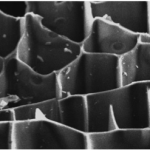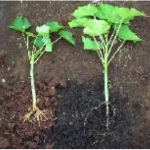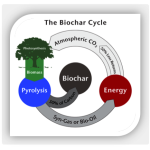Quick Facts
- Derived from clean, pyrolized woody biomass
- Holds seven times its weight in water
- Improves soil structure, has high pH & high CEC
- Long term atmospheric carbon sequestration
Quick Facts
Biochar is a solid material obtained from the pyrolysis or gasification of biomass. The process results in an extremely porous, light weight carbon rich material that can improve water and nutrient retention in soils, in addition to providing numerous environmental benefits. Biochar can be used as a product itself or as an ingredient in blended products, with a range of applications.
Biochar products are developed for diverse applications including agriculture, habitat restoration, landscapes, soil reclamation, and gardening.
 Soil’s Best Friend: Biochar’s chemical and physical structure gives it the unique ability to attract and hold nutrients, microorganisms, moisture and agrochemicals. Even hard to hold nutrients like nitrogen and phosphorus are retained.
Soil’s Best Friend: Biochar’s chemical and physical structure gives it the unique ability to attract and hold nutrients, microorganisms, moisture and agrochemicals. Even hard to hold nutrients like nitrogen and phosphorus are retained.
 Enhanced Yields: Fertilizer supplemented with Biochar can significantly outperform fertilizer alone. Relatively inert, Biochar can persist in soil for thousands of years, along with the inherent benefits of water and nutrient retention and overall soil porosity.
Enhanced Yields: Fertilizer supplemented with Biochar can significantly outperform fertilizer alone. Relatively inert, Biochar can persist in soil for thousands of years, along with the inherent benefits of water and nutrient retention and overall soil porosity.
 Sustainable Environment: All WalkingPoint Biochar products are derived from clean pyrolized woody biomass. Biochar retains up to 50% of atmospheric carbon, effectively sequestering it for thousands of years in the form of persistent organic matter.
Sustainable Environment: All WalkingPoint Biochar products are derived from clean pyrolized woody biomass. Biochar retains up to 50% of atmospheric carbon, effectively sequestering it for thousands of years in the form of persistent organic matter.
Biochar Benefits
WalkingPoint Biochar products use only the finest pyrolized woody biomass for fast and efficient soil penetration. Biochar is an excellent choice for agriculture, gardening, soil remediation, golf courses, landscapes and ornamentals. These top quality products make your application easy.
An excellent choice for large scale agricultural operations, as well as environments where large equipment and dust are prohibited: